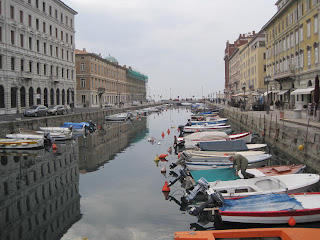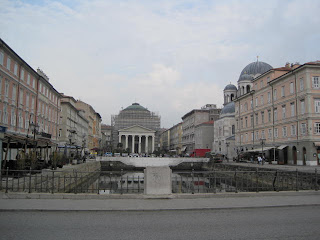Showing posts with label Italy. Show all posts
Showing posts with label Italy. Show all posts
Tuesday, May 1, 2012
Captain Corelli's Mandolin
This novel, by Louis de Bernieres is charming, funny, and one of those novels that, though brilliant, knows of its own brilliance and aims for accolades while reaching mediocrity.
I picked up Captain Corelli's Mandolin from the shelf in my room, because it was there. I'd heard of the movie, and seen an excerpt in one of the students' books in school. I figured I might as well give it a try, since the World War II theme is ever-popular (and often present) in conversations I seem to be having - with others and myself. Plus, I've been contemplating writing my own historical novel. So far it's been without success, but the thought still surfaces now and then.
The story takes place just before the outbreak of World War II on the Greek island of Cephallonia, where the locals live as their ancestors did one hundred years prior, simple lives without electricity or running water. A love story emerges, that of the local doctor's daughter, Pelagia, and the young fisherman Mandras.
However, Madras enlists once the war begins. He wants to be a hero and prove himself to Pelagia. During his absence, she loses her love for him because he does not reply to her letters (he is illiterate) and once he returns, she wants nothing to do with him. He joins the communists and holes up in the mountains with the ELAS.
Meanwhile, Mussolini's troops roll into town. Heading them is Capatian Corelli, a consummate musician. He plays the mandolin, and would like to become a professional in an orchestra after the war. He meets Pelagia, and the two fall in love, slowly but deeply.
Trouble brews in 1943. The Germans demand Italy turn Greece over to them, and the Italians refuse. A massacre ensuses, and Corelli escapes. Pelagia knows he must flee - this is best, the only way for them all to survive. Years (and I'm talking years) later, Corelli and Pelagia are reunited. Happily ever after, it seems.
The novel is expansive, over 400 pages, and spans several decades, focusing for the most part on the 1930s and 1940s and the occupation of Cephallonia by the Italians. It is ultimately a love story that incorporates war, music, a critique of antiquity versus modernity, and the idea that, according to de Bernieres, "history ought to be made up of the stories of ordinary people only."
This idea, though noble, seems to be the reason novels exist; histories are for the victorious politicians and memoirs are for the famous. As a historical novel, Captain Corelli's Mandolini did its duty. I enjoyed every bit of the gripping, gory, thrilling and romantic story. I found the characters human; I could relate to them, I could love them and worry about them and want the best for them. But, it must be said: I knew it was made up. That neither changed my feelings about the novel, nor did it prompt me to dismiss everything I'd ever heard about World War II. It did make me think that there is more to history than what meets the eye in the average text. For that, I'm glad I read it.
But, frankly, the ending sucked. I'll have to watch the movie to see if they changed it to be more "Hollywood." I which case, I might just change my mind about the book's ending...
Labels:
1940s,
book review,
books found in my apartment,
chick lit,
Italy,
writing,
WWII
Sunday, April 15, 2012
On to Italy: Trieste
After Ljubljana, we took the bus to Trieste (you can only get there by bus from Slovenia) to see more of the Adriatic coast. Interestingly, it was also in some ways a history lesson, considering Trieste was one of the oldest parts of the Habsburg empire, having been "collected" in 1382 by Leopold III.
Though once part of ancient Illyria, and more Slavic than Italian (the city was only annexed in 1918), Trieste is today a part of Italy for mostly political rather than cultural reasons. An important port during the Renaissance and the crossroads between Venice and Vienna, Trieste became Maria Theresia's favorite way to keep the Slovenians and Croatians under her thumb, by promising trade and wealth and baroque buildings painted yellow. French troops occupied the city during the Napoleonic Wars, though the city retained relative autonomy because for some reason (unlike the other large Habsburg cities) German-speaking Austrians could not be persuaded to move there. For example: only 5% of the population in Trieste spoke German at its peak (most spoke Slovenian) compared to 51% in Prague, and roughly 60% in Budapest.
I just finished a history of the Habsburgs borrowed from the library - can you tell?
And the most delightful experience: around the amphitheater there are lots of stray cats (as pictured below) and a little boy with his grandparents came up to the railing and started saying, "Meow!" He reached out to pet one of the cats, when his grandmother said, "Non toccare il gato!" (Don't pet the cat). The cat ran away and the the little boy waved, saying, "Ciao, meow!"
And, of course, there is a castello in Trieste. We went and took pictures. There was also a museum, which houses Roman artifacts, but none of my pictures really turned out.
 |
| Another Roman arch |
We also took a trip out to Miramare, built in 1856, which was the summer home of Archduke Maximillian (brother of Franz Josef) - the one who inherited the title Emperor of Mexico from the Spanish side of the Habsburgs, and upon arrival in Mexico was executed. It's not easy being emperor of a country you've got no emotional ties to...
We took a tour of the castle, and the gardens, and had a picnic. The weather held for most of the day, and we were rained out at night, when we had to duck into a bar to get out of a downpour. Yes, unfortunately, it was not the Italian weather most of us anticipate, but it is April. And you know what they say about April showers...!
 |
| a break in the gardens |
All in all, Trieste was a bit of a disappointment after Ljubljana, mostly because it rained more, but also because the vibes of the two cities are so incredibly different. To me, Trieste seemed very static, stuck in the past, a sort of shy younger sister to Venice, whereas Ljubljana had a much younger, more resourceful and less staid atmosphere. Even as an outsider who had never before been, I could tell: things are changing in the former Yugoslavia. Tourists? Stability? A capitalist economy? It's on the verge of something.
Location:
Trieste, Italy
Sunday, May 8, 2011
Cinque Terre: Another Look at Italy
 |
| Callie and Sarah: Vernazza from the pier |
I will, however, clarify what the Cinque Terre is, for those unfamiliar: it is both a national park in Italy (protected wildlife and all that...camping, hiking trails, etc.) and five towns near the national park, which, if I may, are basically an Italian Door County (i.e. tourist destination) with overpriced restaurants, charming views, cozy B&Bs, and the odd cultural event.
Onto the photos:
VERNAZZA (where we stayed)
 |
 |
 |
 |
CORNIGLIA
 |
| from the trail |
 |
| at the train station |
 |
 |
Funny story: there was this refrigerator on the trail
<--
We had to wait for it to pass before we could continue. Guess that proves people really do live up in these hills...

 |
| Me and Sarah on the trail |
 |
| My happy-face Latte :) |
MANAROLA
 |
| A church in Manarola - we did not go in. |
 |
| Callie & Sarah on the Vineyard walk |
 |
| view of town |
RIOMAGGIORE

 |
| The "Via dell'Amore" - Way of Love :) |
 |
| Amore |


 |
| Portofino: where the movie stars hang |
And last but not least, Portofino (not technically part of the Cinque Terre, but part of the Italian Riviera)!
We went to scope it out...and maybe hope to do a little celebrity stalking ;) - but to no avail! Ah, well.
Labels:
Cinque Terre,
Italy,
Lawrence,
Nationalfeiertage,
sightseeing,
spring,
swimming,
trail,
train,
travel,
wine
Location:
19018 Vernazza La Spezia, Italien
Subscribe to:
Posts (Atom)






















































